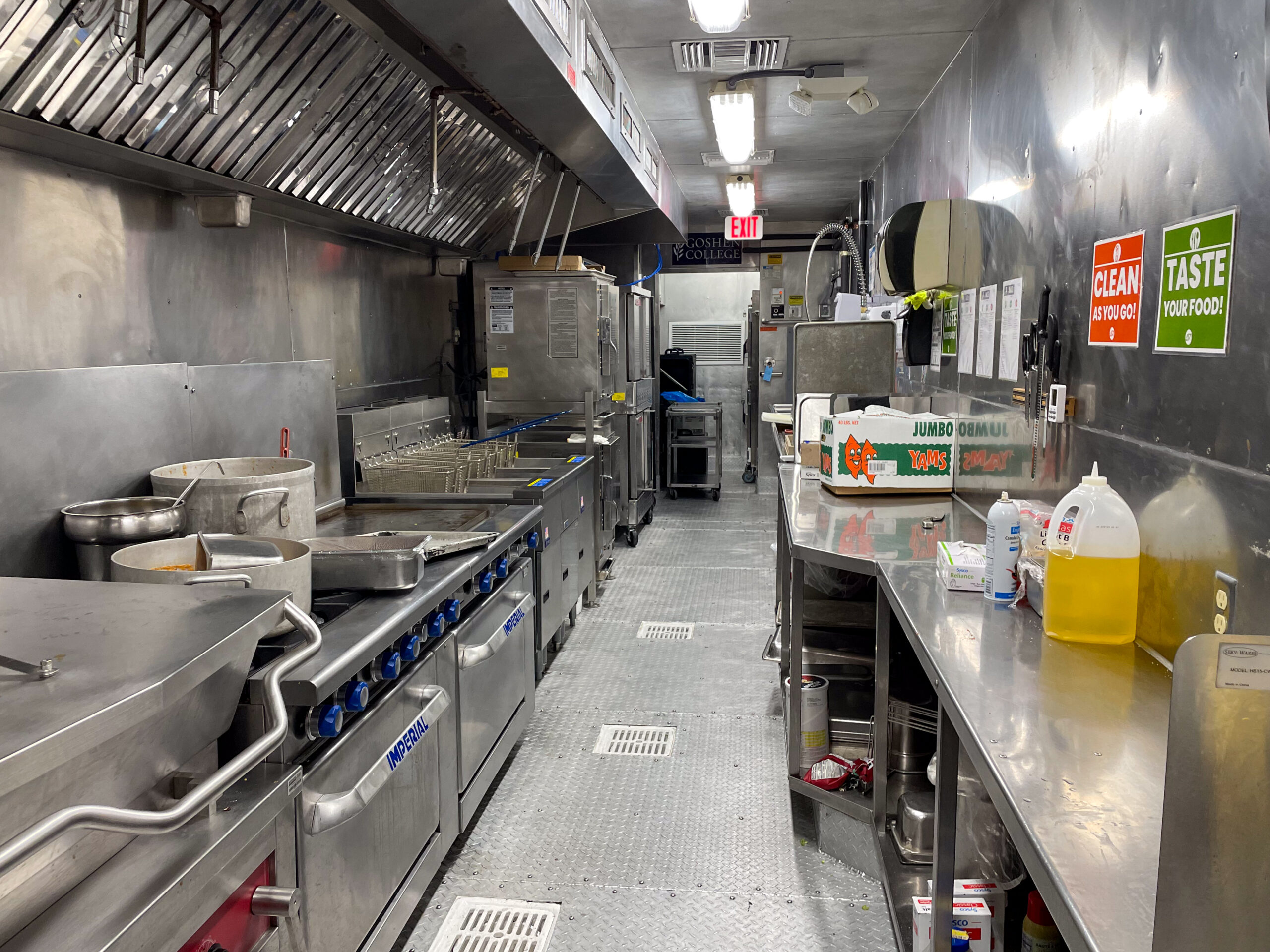Westlawn Dining Hall hadn’t felt quite the same the past few weeks. Its usual round tables were replaced by long, rectangular tables, shrouded in cheap, purple plastic tablecloths — the kind that are fun to make holes in at birthday parties. The juice machine was gone, replaced by large see-through coolers that had to be filled with ice to keep the juice cold.
Just like its orange juice, Westlawn had become a bit watered down. Red tape labeled “danger” lined the street and Kulp entrances. A few electrical cords hung from the wall. The artwork hanging over the fireplace had long been taken down.Most soda options on the machine were covered by paper slips that read, “temporarily out of order.” With an entirely new kitchen not promised for another school year, the soda machines’ temporary out-of-order prognosis is likely more permanent than usual.
Cormac Koop Liechty, a junior communication major, sat alone at a table, picking up a quick bite to eat before his radio shift. His solitude served as an opportunity for contemplation.
“It feels like the end of an era,” he said of Westlawn’s temporary closing.
But it’s not. Seasons will pass and Westlawn will open again, largely unchanged to the average student. In the meantime, though, students have to be fed. Breakfasts, lunches, dinners, desserts, salads and snacks all need to be made available.
Goshen College faculty showed up last Saturday morning to help with the final kitchen move. Items that wouldn’t be used during the upcoming year were stacked on tables in Westlawn, covered with sheets to keep the construction dust off. The remaining tables and chairs were carted over to the Union building as students slowly started to arrive for the first meal served out of the Union.
One such worker was Rebecca Stoltzfus, president of GC. When asked about why so many employees would give up their Saturdays to help with the move, she reflected on how big of a moment this is in the college’s history.
“I think for a lot of our employees there’s a sense of history,” she said. “This is a year that everyone will look back to and remember. We have really committed and generous employees.”
While the Church-Chapel building was also considered as an interim Westlawn location, it was quickly clear that the Union building offered the best space to pull it off.
“We were trying to figure out how best to serve the students and that was the best collaboration,” said Cynthia Good Kauffman, director of planning and events. “The church would have taken a lot more [machinery].”
This was echoed by Jeremy Corson, director of AVI Fresh, who, while giving me a tour of the new space, mentioned some of the infrastructure changes that had to go into installing the various slicers, mixers and coffee makers, noting especially the “200-amp transformer” that was added to power the appliances.
The backbone of the new setup is a semitrailer, parked right outside the Leadership Hub, dedicated to cooking lunch and dinner entrees. Inside, it features various cooking setups, along with a refrigerator and freezer. It runs off a newly installed thousand-gallon propane tank. When everything in the trailer is on, the temperature rises to about 95 F, meaning they can’t use all the fixtures at once. Just another unique challenge of the move.
Moving inside, the Leadership Hub has been transformed into dry storage, catering prep, a bakery, a deli and final food preparation. Food flows from the trailer, through the Leadership Hub, and into the Union common area where students can access it.
Plans like this don’t pop up overnight. This is the culmination of countless hours of conversation. Throughout the process, the college was careful to approach their relationship with AVI Fresh as a mutual one, in order to create the best outcome for everyone.
“Obviously it’s a huge disruption to Jeremy’s operations,” Stoltzfus said. “To come up with a plan that worked for Jeremy and AVI and our students required a lot of negotiations and conversations. Those have been very much in the spirit of partnership, of ‘let’s get this done, let’s feed these students.’”
“AVI has been so successful here because of that partnership,” Good Kauffman added. “Previous dining service folks were not that way and they didn’t last very long.”
Still, there are things that didn’t come to the perfect resolution. One is dishware. Since the Leaf Raker doesn’t have the facilities to wash dishes, AVI Fresh and the college had to pivot.
“We can’t wash the dishes,” Good Kauffman said. “We’ve been struggling with how do we match our sustainability goals with the fact that we have to eat off of disposable. AVI partnered with us to find composting materials, and we’ll keep working on it through the year.”
All in all, the first few days have gone swimmingly for Corson and his staff. There are the expected wrinkles, like confused students, but overall it has gone well.
“It’s been a home run,” Corson said. “It’s been really good.”
As the semester continues to ramp up, AVI Fresh will continue to bring back various features, such as oatmeal, which they brought back yesterday. The goal is to have as few sacrifices as possible.
“We’ve killed the Leaf Raker for a year, unfortunately, but that’s just the way it is,” Corson said. “We’ve made this a food court. Next year we’ll be reaping the new kitchen and be able to put out really great food.”




